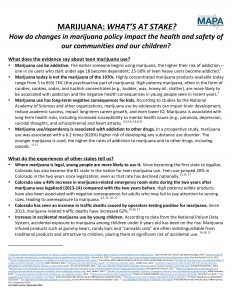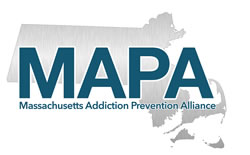The scientific evidence is clear: marijuana is harmful to young people and has the potential to do significant harm to public health. Among many dangers, it is linked to mental illness including, addiction, psychosis, anxiety and depression, IQ loss and schizophrenia.
Despite these harmful consequences, marijuana is now legal in Massachusetts. The burgeoning commercial, recreational marijuana industry seeks to advance a strong market of consumers in the Commonwealth. MAPA continues to call for control and regulation measures that prioritize public health and safety and limits profit-driven growth of the commercial recreational marijuana industry.
To support substance use prevention and social, emotional, and mental health promotion, state and local leaders must support strategies that minimize the reach of the marijuana industry and promote healthy, drug-free norms for families and communities.
To protect young people, it is important for individuals to be armed with the facts about this drug and predatory industry strategies working to profit from the sales of marijuana.
The Massachusetts Addiction Prevention Alliance supports a Statement of Concern and Call to Action that was released in May 2019.
Massachusetts-Specific Resources
Here are some links to useful information about Massachusetts laws about marijuana.
The Massachusetts Marijuana Law
Generally speaking, Massachusetts residents aged 21 and older are permitted to possess and use marijuana. However, there are limits on the amount which may be lawfully possessed, the locations where it may be used, and certain other factors. The Commonwealth of Massachusetts has authored a fact sheet that explains some of the requirements, which you can read here.

If you are interested in learning more about the technical requirements of Massachusetts law, please consult G.L. c. 94G: The Massachusetts law regulating the use and distribution of non-medical marijuana. These measures were further amended by Chapter 55 of the Acts of 2017, “An Act to Ensure Safe Access to Marijuana.” The Massachusetts Cannabis Control Commission also has established various administrative regulations.
Local Control
The Massachusetts Law includes a provision that gives towns the local control to opt out. Many cities and towns across the Commonwealth have exercised this option through local referendum and zoning processes. To learn more about this local option, click here.

Cannabis Control Commission
The Cannabis Control Commission is the regulatory body with oversight of marijuana laws and licensing in Massachusetts. Their Website includes information about Massachusetts marijuana law and policy, as well as updated information about licensure of dispensaries and sales information.
Social Equity Program
Under Chapter 55 of the Acts of 2017, the Cannabis Control Commission is required to ensure that people from communities that have been disproportionately harmed by marijuana law enforcement are included in the new legal marijuana industry. This handout from the CCC summarizes the Economic Empowerment Priority Review and Social Equity Program, which currently target approximately 29 communities.
Public health and addiction prevention professionals are now raising the alarm about how the Social Equity Program is likely to increase public safety risks, health inequities and disparities. The Social Equity Program written into the regulations increases availability and access to marijuana among the populations already disproportionately affected by cannabis use disorder and youth marijuana use, including people of color. The “Social Equity Program” is well intentioned: It aims to distribute the “economic success” of a regulated marijuana market among communities that have traditionally been excluded from economic opportunity. However, marijuana is not an ordinary commodity; low income and minority communities have a perilous history of being targeted by predatory industries that profit from those who become addicted. The Cannabis Control Commission’s regulatory language drives market growth, targets communities with high unemployment rates (low income), minorities, veterans, the LGTBQ population, and is counter-productive to the state’s addiction prevention goals.
Read MAPA’s response to the Cannabis Control Commission, here.
Marijuana Research and Policy
Medical and scientific research clearly show that marijuana is an addictive substance and that its usage can be harmful, particularly for young adults. In particular, the scientific evidence shows:

- Marijuana can be addictive. The earlier someone begins using marijuana, the higher their risk of addiction — one in six users who start under age 18 become dependent; 25-50% of teen heavy users become addicted.
- Marijuana today is not the marijuana of the 1970s. Highly concentrated marijuana products available today range from 5 to 85% THC (the psychoactive part of marijuana). High potency marijuana, often in the form of candies, cookies, sodas, and hashish concentrates (e.g., budder, wax, honey oil, shatter), are more likely to be associated with addiction and the negative health consequences in young people seen in recent years.
- Marijuana use has long-term negative consequences for kids. According to studies by the National Academy of Sciences and other organizations, marijuana use by adolescents can impair brain development, reduce academic success, impact long-term career growth, and even lower IQ. Marijuana is associated with long-term health risks, including increased susceptibility to mental health issues (e.g., paranoia, depression, suicidal thoughts, and schizophrenia) and heart attacks.
- Marijuana use/dependency is associated with addiction to other drugs. In a prospective study, marijuana use was associated with a 6.2 times (620%) higher risk of developing any substance use disorder. The younger marijuana is used, the higher the rates of addiction to marijuana and to other drugs, including opioids.
MAPA has developed a series of resources to explain the harmful effects of marijuana use, and how public policy that expands access to marijuana use and possession is harmful. Click here to read a fact sheet explaining more about these issues.
You might also wish to consult this 2015 white paper from Molecular Psychiatry, which concluded that cannabis users show increased susceptibility to false memories.
The Massachusetts Medical Society has an informative Website that explains some of the dangers of marijuana use, including use by young people. You can read more about these dangers on this page.
The Substance Abuse and Mental Health Services Administrations also offers more information about the harms of marijuana.
Click here for more information about medical marijuana and its effects.
Canada legalized marijuana in 2018. Click here to read about Canada’s marijuana health warnings.
To learn more about the harmful effects of marijuana and nationwide policy, go to Smart Approaches to Marijuana (SAM).
SAM is a partnering organization working to inform the people with reliable data and science. You can find out more about their research and information sheets by clicking here (note: external link).
Disclaimer – The laws and regulations controlling the possession, use, and distribution of marijuana in Massachusetts are complicated and subject to change by the Massachusetts General Court, the Cannabis Control Commission, and local regulating authorities. Please note that, as part of the Massachusetts marijuana law, individual cities and towns have authority to enact their own rules about marijuana, which may be considerably more strict that the statewide guidelines. Communities that voted against the 2016 referendum also have the ability to opt-out of the state law permitting sales within their community. Therefore, caution should be taken to research all laws applicable to your jurisdiction. While we make every effort to maintain this site with accurate and up-to-date information, nothing in this site is intended to constitute legal guidance or advice. We make no promise or guarantee concerning the accuracy, completeness, and legal sufficiency of information herein. If you have specific questions regarding your rights and obligations under Massachusetts law, please consult an attorney.

